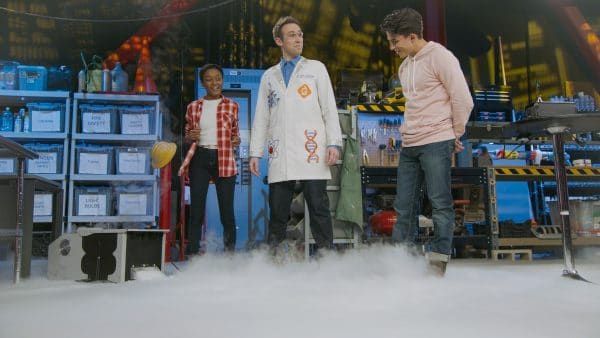If you are on a school computer or network, ask your tech person to whitelist these URLs:
*.wistia.com, fast.wistia.com, fast.wistia.net, embedwistia-a.akamaihd.net
Sometimes a simple refresh solves this issue. If you need further help, contact us.
Water Cycle (6-8 Version) Activity for Kids
Cloud in a Bottle DIY
- Duration: 20 min
- Difficulty: Medium
- Cost: $0 to $10
Learn how to form a cloud in a bottle!
Material List
- 12-liter Plastic Bottle
- 1Bottle of Rubbing Alcohol
- 1Cork
- 1Pump with an Inflating Needle
- 1Pair of Safety Glasses
Instructions
- 1Carefully push the inflating needle through the cork (adult help may be needed).
- 2Pour a little bit of rubbing alcohol into the bottle and swirl it so that the liquid coats the entire inside. Rubbing alcohol is flammable, so make sure to keep it away from any flames.
- 3Insert the cork into the bottle and give it several pumps. The more pumps you add the better it will work.
- 4As quickly as you can, remove the cork and watch the cloud form!
How It Works
We used rubbing alcohol because it evaporates faster than water and creates a more visible cloud. Pumping air into the bottle squeezes the molecules of gas closer together. When you pull out the cork, the gas expands and cools down, making the vapor condense into tiny liquid droplets, just like a cloud! The process of gas turning into a liquid is called condensation.
Find More
Exciting Activities
More Activities
Browse All
Full Lessons
Watch Full Lessons
Skip, I will use a 3 day free trial
Enjoy your free 30 days trial
We use cookies to make your experience with this site better. By using this site you agree to our use of cookies. Click "Decline" to delete and block any non-essential cookies for this site on this specific property, device, and browser. Please read our privacy policy for more information on the cookies we use.Learn More
We use cookies to improve your experience. By using this site, you agree to our use of cookies. Click "Decline" to block non-essential cookies. See our privacy policy for details.Learn More








